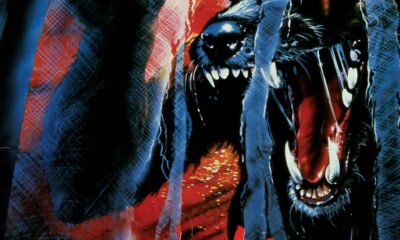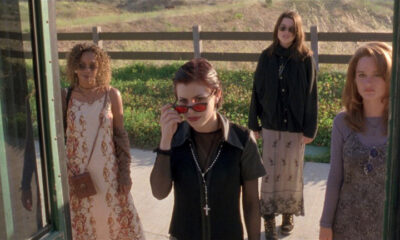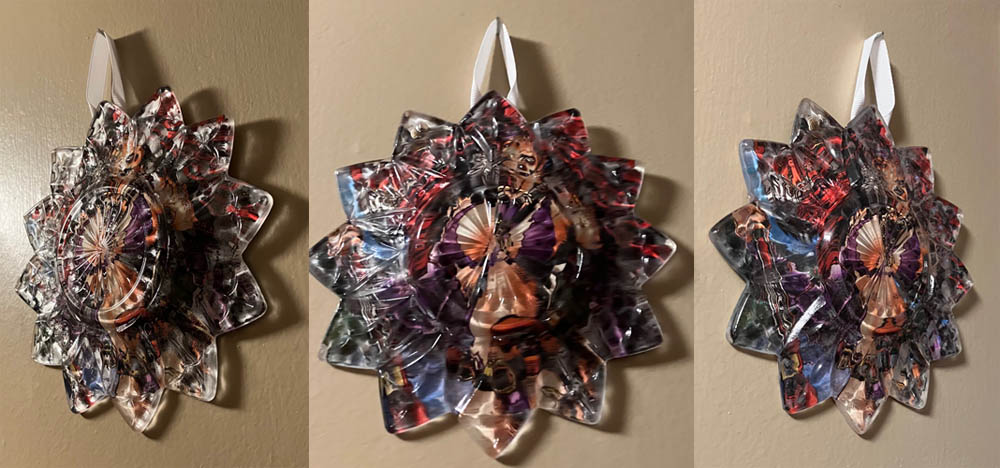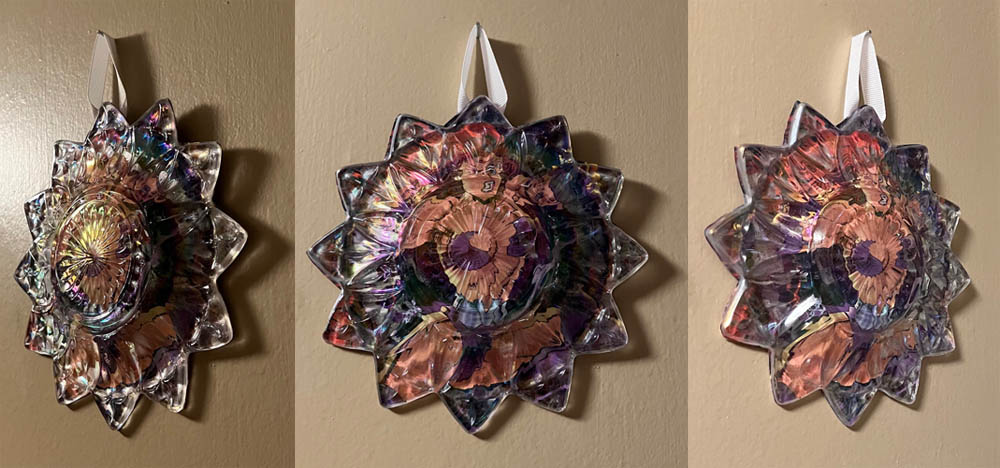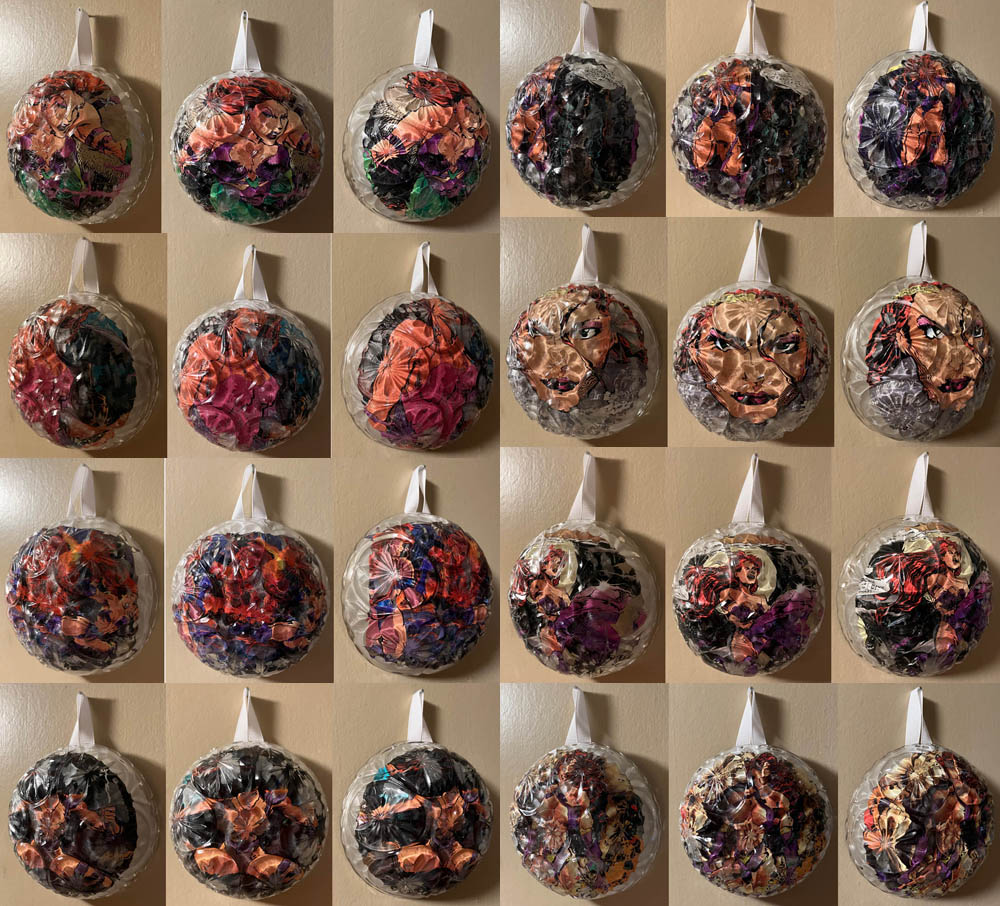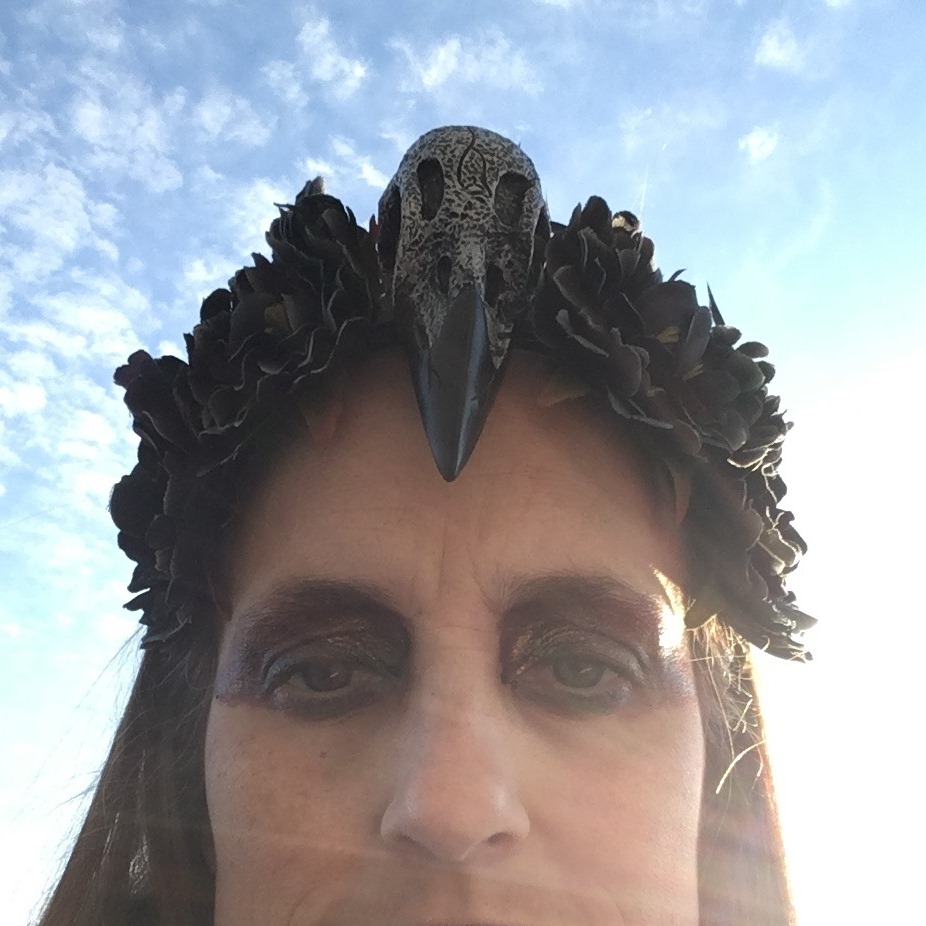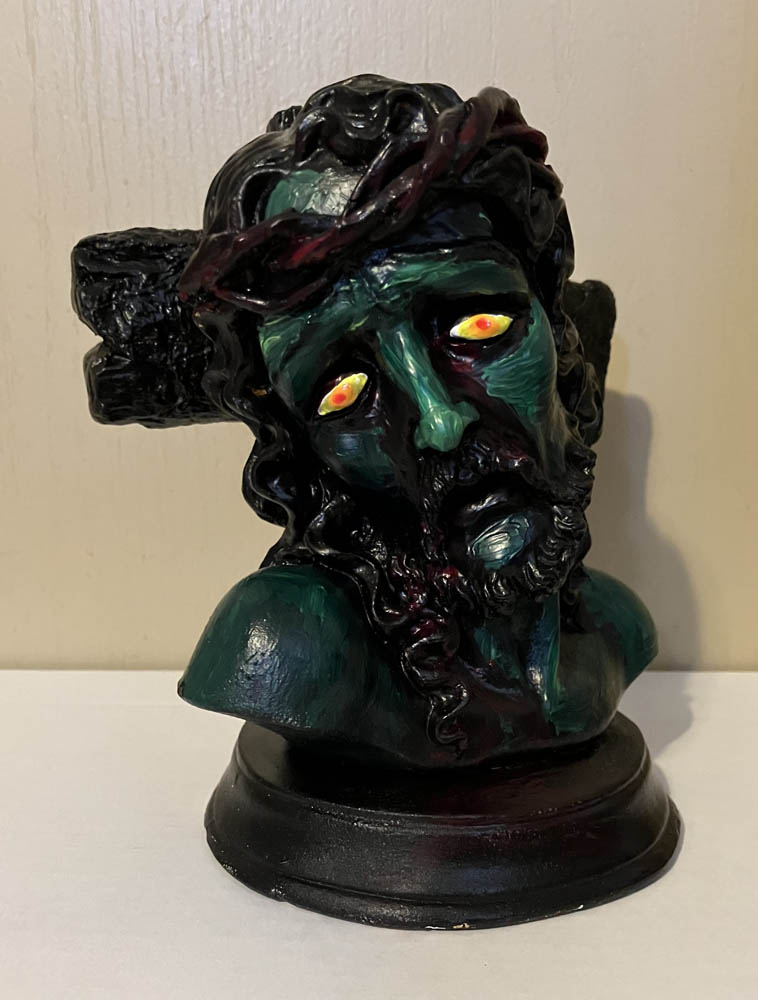
Haunted MTL Original – The Rat – Ben Gartner
More Videos
Published
5 years agoon
The Rat by Ben Gartner
Marie DesJardin killed her husband with a shotgun, but it wasn’t murder; it was mercy.
Pierre DesJardin was a scientist, eager to make a name for himself. One of those young men who is smarter than the people hiring him, but who doesn’t have the patience to explain to them how their slow climb up the scientific ladder makes them stuck in the old ways compared to our modern “Fail Fast” era. Pierre was the high school student who mixed too much of the solutions together in Chemistry class to see what would happen, specifically when the teacher warned about straying from the directions. However, he’d inflate the proportions in the right and precise doses to elicit a bigger effect. His only crimes were anticipating the results his professors hadn’t.
“It’s sort of a quantum entanglement device, but uses a raw substrate to redraw the target matter,” he explained to Marie.
“A glorified three-D printer?” she teased.
He smiled with eyes half-slits and the corner of his mouth turned up in a devilish grin. “Yes, a glorified three-D printer,” he responded, sarcasm dripping from his words. He loved her teasing, though it was part of the charade for him to pretend to be offended.
Marie perked her eyebrows and adjusted her glasses, then leaned back into the eyepiece of her microscope. Research into the mitotic processes of one-celled organisms was her specialty, and she was nearing completion of a paper her mentor, Dr. Gladstone, said had “great potential” for publishing by the scientific journals.
“You think too small,” Pierre chided, a bad joke at her studies.
“And pay the bills,” she whipped back, though turning to him, recognizing that may have hit too close to home. She was a paid professor at their University, while he was dedicated to research on a stipend that didn’t even cover their grocery bill.
The aroused attention he was giving her a moment ago faded and he turned away. “This device will transform how goods are transported around the world. Imagine—no roads, no cars, no planes needed to cart freight all over the world.”
“We’ll still have those things for people.” Marie looked into her microscope.
Pierre’s cheeks simmered. “There’s no reason this couldn’t work for living creatures as well. Reconstruct them down to the exact atomic structure as had entered the machine.”
Marie snorted. “Then you could reboot someone from any saved state.” It was a question, though she often worded them as statements. She’d heard somewhere that women who speak every sentence as a question—even facts, and especially opinions—are perceived as weak. And weak, Marie DesJardin was not.
“I hadn’t thought of that application, but I don’t see why not,” Pierre stroked his chin. “Even make a clone of your current state. Oh god—” he shivered.
“I think you’re getting ahead of yourself, Pie.” Easy as pie, her cutesy nickname for him.
Pierre didn’t hear her; he was rushing off.
He sped down the hallway, around the corner to the elevator, then down to the third floor physics lab. Inspiration had struck and he sat at his computer punching in edits to his equation. The magic flowed from his fingers and hitting the final Command+S to save his work gave him a jolt of electric excitement. He stood and looked at the big screen, hand over his mouth. He’d erased a third of what he had only minutes ago, but this new algorithm seemed more eloquent.
Nobel Prize eloquent, floated through his mind and he laughed.
Looking up and around the room, he found it deserted. As expected on a Sunday afternoon. He and Marie liked to come in together on Sunday afternoons. Married for seven years, Pierre had never experienced the seven-year-itch. He loved his wife. Her being a part of his life had only grown more and more comfortable as time went on.
A discovery like this might change everything though.
He had to try it.
An object. He needed an object to try it on. Something small and simple for the first test. His mug, a simple white ceramic mug with the logo of the university that had been paying his sponsorship for six years.
“No results in six years is not atypical, Mr. DesJardin,” his grant supervisor had comforted. “But ten years and they’ll want some sort of return on their investment.”
He had to try it.
He’d gutted two countertop vacuum ovens for a transmitting and receiving device, wired into a power generator he’d borrowed from the Mechanical Engineering lab, and connected to his laptop via Ethernet cable. Another high-bandwidth fiber-optic cable connected the two devices. The transmitting machine would tear the matter into its basic building blocks—atoms—that would then transport across the fiber-optic bridge to the recipient machine.
With the mug in one oven, Pierre closed the lid and initiated the vacuum seal.
When both oven lights green, Pierre swallowed and hit Enter on his laptop, executing his new algorithm.
There was a bright flash inside the sending device, followed by a cracking flash in the recipient device. The walls and door of the sturdy recipient oven bulged outward as if there’d been a tiny explosion inside. The green light had gone off, indicating the vacuum seal had broken.
Pierre ripped open the door of the device. A quick cloud of white vapor poured out, misting into the air. And there he saw it. His mug.
“Ha!” Pierre grabbed the mug. It was hot and burned his skin, leaving a white stripe down his palm and on his fingers. He recoiled and cursed, then grabbed some tongs and pulled out the mug.
It was solid. It was whole. He turned it upside down and around and knocked it on the counter. It clunked with a satisfactory integrity that made Pierre punch another laugh out loud.
“I have to show Marie,” he exclaimed, then stopped. Something was off about the logo on the cup. It was backward. Hm, he thought, then dashed out of the lab.
A moment later, Marie was with him by the lab bench. Her eye first caught the mushroomed vacuum oven. “Oh, Pie, those are four thousand dollars.”
“Who cares, Marie?! The university will buy me a hundred more when I show them what I’ve done!”
“Show me, I want to see.”
“Yes.” Pierre looked around the lab, saw another countertop vacuum oven on the other side of the room and was dashing over to grab it at a run. He couldn’t remember ever being so excited. Well, maybe except when Marie had accepted his proposal. But even with that, he knew her answer. This time, though he knew his math should give him this result, to hold the effects of what was nothing short of magical . . .
He plugged in the new oven. “What should we transport?” He looked around the room.
“The mug again?” she asked.
Pierre’s gaze lingered on a rat he could see through a window, in the lab next door.
“Pierre, you’re not thinking—”
“No one will miss one rat.” He was moving toward the door.
Marie chuckled and sat on a stool, watching Pierre glide into the adjacent lab and “borrow” one of the biology-lab rats.
He stroked the rat’s fur as he inserted it into the breadbox.
“But the vacuum will kill it.” Marie put her hand on Pierre’s.
“I’ll time it just right so it’ll only be exposed for a few seconds. It’ll be fine, though maybe its ears will ring when we expose it to full pressure again.”
“Goodbye, little rat.” She put her head down as if at a funeral and wiped a fake tear.
“Hello, Nobel prize,” Pierre said, smiling. He loaded up another sample of gel into the new recipient box and sealed it shut. “Wait.” His finger hovered over the button on the rat’s box to create the vacuum. The rat scurried around inside, whiskers twitching.
“What?”
“The heat. I forgot about the heat. When I pulled the mug out, it was hot.” He opened his hand to show Marie, the blister already puffy in a line down his palm and on the inside of his fingers. His eyes lolled up to the left as he thought about how to solve the heat problem.
“Ice?”
“That’d cool it down quick, but it will still be hot from the explosion of reformation.”
“Looks like you have a stay of execution, little rat.” Marie bent down and tapped on the glass.
“Drat.” Pierre’s exuberance was gone and he was off into his mind, calculating and turning the situation over and over.
“Show me the mug,” Marie insisted. “I want to see it work!”
“I don’t want to waste this oven. I’ll—” He typed into his computer. Marie knew that distracted look.
She smiled and kissed him on the head. “Check on you later.” He didn’t look up, and she left without another word.
Two hours later, with her own work wrapped up for the day and the October sun fading through the treetops, Marie went back to check on Pierre. “Let’s go get some dinner. I’m starved.”
Pierre didn’t respond, his hand running through his disheveled hair, a pencil between his teeth.
“Pierre!” she shouted from the doorway. He didn’t look up. “Pierre, let’s go—”
“Leave me!” he shouted, tossing his hand back dismissing her, without looking up. It wasn’t the first time he’d snapped at her like that and it turned her blood cold. Every time, afterward, he’d apologize and promise he’d change, but he never changed. People don’t change.
She left without saying another word, slamming the lab door behind her, rattling the glass, wondering how much more she could take.
#
Pierre didn’t come home that night. It wasn’t the first time, so Marie didn’t wait up. The next morning, she called him on his mobile phone, but he didn’t respond. She didn’t leave a voicemail. Marie didn’t work on Mondays, and it was her day for errands, grocery shopping, the to-do of checklists, so she went about her chores, forgetting about her husband—until that night, when he didn’t come home for dinner.
She called him again, but still no response. Still later, while brushing her teeth, she typed in a text message to him, then erased it and plugged in her phone for the night.
#
Pierre didn’t come home that night either. The next morning, Marie was worrying. He still wasn’t answering his phone.
“Selfish,” she said to herself, then cranked the keys in the ignition and headed toward the University. It was a workday, and they worked in the same building, so she debated if she should continue “giving him space” or if she should check to make sure everything was okay.
The decision was made for her. She parked her car and walked over to her building. Police motorcycles were parked in front of the entrance and yellow caution tape had been wrapped around the front. And now that she realized it, more sirens were approaching.
Marie hustled to the officer standing guard in front of the tape. “Officer, my husband is in there.”
“I’m sorry, ma’am. No one is allowed inside right now.” His eyes hid behind mirrored glasses, his lips taut, brown cheeks pocked with old acne scars.
“Well, can you at least tell me what’s going on?” Marie hoisted her backpack and leaned in, making it clear she wasn’t going to be that easy to get rid of.
“I’m sorry, ma’am. Please, just—” The sound of breaking glass from above cut off his words. They both looked up in time to see a desk floating through the air, smashing into the concrete and splaying out like a tired horse.
The officer jumped onto his radio. “Martinez, report.”
Static.
“Martinez, report.”
Nothing.
“Shit.”
Marie backed away from the building, looking to the shattered window on the third floor, just in time to see a man—her husband—pull away from the open rectangle. It was her husband, wasn’t it? He had pulled away, with something over his head. She recognized the clothes, and she was sure he’d seen her. He’d looked toward her, though with that brown thing around his head, she couldn’t be sure. But she felt sure. Right?
Two more police cruisers and a large van with SWAT stenciled on the side pulled onto the grass near the front of the building. Soldiers rushed past Marie, her head spinning. She fumbled in her backpack for her phone, pressed the face of Pierre to call him. Straight to voicemail and she hung up.
“Pierre—” What had he done? What had happened?
She rushed back over to the police officer. “Please, that’s my husband up there.” That caught his attention. “Tell me what’s going on!”
“That’s your husband up there?”
“I think so, yes. What’s happened?”
“Ma’am, come with me.” He took her by the elbow—with a little pinch—and took a step to escort her away, grabbing for his radio.
Marie twisted her arm free and bolted for the door. The tape prevented it from opening all the way, but it was enough for her to squeeze through. She sprinted past the elevators and slammed into the stairwell door. As she entered, she looked to the front door. The officer had entered and was talking into his radio.
Up three flights of stairs two-by-two, her interval sprint training paying off.
She burst into the third-floor hallway and swerved her head toward the physics lab. Every window was smashed and spidered, the door ripped off its hinges. The sound of a helicopter broke her from her stare. She walked over to the open doorway into the lab, scanning with wide-open eyes.
“Pierre?” she said, a whisper, voice trembling. She could smell smoke.
From behind a lab bench, a paper airplane came soaring toward her. Given the chaos of the trashed lab, the broken glass, the tumult of the scene, the gently gliding kid’s toy seemed surreal. She watched it land at her feet. On one wing was a scrawled note.
READ ME
“Pierre?” she called. No answer. The helicopter outside the window. She could see men looking through the scopes of rifles.
She picked up the plane and unfolded it. More of the bad handwriting, like a child or someone writing with their non-dominant hand, all caps.
GO AWAY. NOT SAFE FOR YOU. I DID IT, M.
It took her breath away to see her initial M. “Pierre!” She jerked toward the lab bench from where the airplane had flown. A squeaky, growling, inhuman sound stopped her in her tracks, making the hairs rise on her neck.
A black-clad soldier came swooping in through the broken window on a rope. He unclasped his harness and slung his rifle around, red dot dancing on Marie’s blouse, the man screaming something unintelligible in the noise.
Marie stood shocked, noticed her hands in the air, the note held in one flapping in the wind created by the helicopter. The man approached, walking nearer to the bench that hid whatever had made that unearthly sound.
As he passed the spot, he did a double-take and swung his rifle toward whatever he’d seen, firing an automatic burst. But then his whole body dropped like something had pulled him down a slide or a trapdoor. Then a sickening crunch and then silence.
Marie stood there, hands in the air, the note flapping like a flag of surrender, her arms trembling, mouth ajar, eyes wide.
“Pierre?” It came out as a squeak, a question, something she heard as weak. She was weak. But no, Marie DesJardin was not weak! “Pierre! What is going on?!”
Suddenly, the body of the soldier flew over the counter, ricocheted off of the ceiling and landed at her feet. A bloodied corpse face down. A white sheet of paper was stuffed under a shotgun wrapped around the man’s back. Trembling, she pulled out the note.
IF YOU LOVE ME, YOU’LL KILL ME.
“Pierre . . .” Water filled her eyes. “What’s going on?!”
Marie DesJardin knew how to handle a shotgun. She’d gone birding every year as a child, with her brothers and her father on their ranch in Idaho. This shotgun was shorter and fatter, but it felt familiar in her grasp.
“I’m coming over,” she said, stepping around the dead soldier. “But I don’t want—to kill you.” She snuffled through the words.
As she approached, a large vacuum oven caught her eye. It was against the wall, and had the same explosive, bubbled appearance as the countertop one in which Pierre had sworn he’d transported the mug. Only this one was large enough for a man to fit inside.
“You did it, didn’t you, Pierre?” She half-smiled through her tears and her fright, stepping through broken glass and damaged laboratory equipment. “But something went wrong, didn’t it?”
She heard scuffling behind the bench and froze in her advance. “Something went wrong. And you’re hurt.” She could not swallow the lump in her throat.
“Let me help you, Pie. Let me see you.”
The terrifying screech sound jolted her senses. The helicopter swerved back into view, red dots appeared all over her blouse. A loudspeaker boomed, demanding she drop the weapon and put her hands in the air.
Without warning, she dropped like lead to the floor, on the opposite side of the bench from Pierre. They were both hidden from the helicopter, a thin island separating them.
“Pie. Come on, it’s me. Let me help you.”
The scuffling, shuffling sound. He was moving toward the end of the bench. He was near the corner. All she had to do was go meet him. Or he could move a foot farther to the edge and she’d see him.
Marie looked over at the dead soldier and the thought flitted through her mind that she should have the shotgun up and aimed.
Pierre moved out from behind the bench into Marie’s field of view. She couldn’t look away from the horror, but she wanted to more than anything in her life. Her heart stopped, her breath choked out, the terror of what was before her wasn’t her husband. It couldn’t be. It was terrifying beyond anything she had seen or imagined could be.
It moved toward her, extending one clawed paw into the flooring and pulling its body along. The hideous arm was pink and bulbous with burnt skin and long deformed fingers, sharp pointed daggers at each end. It was Pierre’s body being dragged in shredded clothes, but the head pointed into a long snout, a bloody pink nose at the end, lips pulled taut over an elongated jaw, jagged yellowed teeth splaying out in every direction, sharp as knives, blood and gore hanging off stripped flesh down to the bone. His big rounded ears had cuts and slashes, dripping blood. Solid eyes like whetstone boring into Marie.
The creature stopped only feet from her. Its slimy, thick whiskers twitched.
Marie came out of her stupor and screamed in panic. She could hear her cry go on and on. She couldn’t move her body.
The creature put its head down on the ground, its mouth moving and making a guttural sound. Like it was . . . like it was trying to talk?
“Pierre.” Marie finally heard herself say his name. The whoosh of other sounds came flooding back. The helicopter. The pop of a metal can rolling to a stop behind Pierre. The canister hissing a green cloud.
Pierre—the rat—trying to mouth a word. Like . . . “Kill” and “me.”
Finally, Marie could swallow the lump in her throat. When it slid down, she was able to take a breath. The green fog hissing from the canister encroached and she knew the soldiers would be there soon.
“I’m proud of you,” she said. She thought she saw the creature smile, or maybe it was a gleam of recognition in its eerie black eyes. “You did it, Pie.”
She relaxed her shoulders, closed her eyes, and pulled the trigger.
Ben Gartner enjoys twisted tales that pull him out of his normal little world. More information at bengartner.com and on twitter @bgartnerwriting.
You may like
Original Creations
Peeping Toms Comic Book Collage Crystal Art by Jennifer Weigel
Published
5 days agoon
July 21, 2024
So I happened upon this very cheesecake-heavy premiere issue of Extremes of Violet, complete with pinups by some of the comic book greats of the time, and decided to make some Peeping Toms collage art by incorporating the voluptuous vixen into various crystal pieces to create a sort of fishbowl effect centered largely on her bosom (which is unavoidable).
Each of the Peeping Toms is shown from three angles because of how much the pieces shift as the light plays off the crystal. I started with these star forms.
The second bowl was even a bit iridescent, and violet at that!
Next I did a series of really perky busty bowls, which really get the feeling across that you are looking through the tiny peephole in a door as well as exemplifying the content even more. Note: these are shown in two rows with side details as well, so there are a lot of pics here…
I experimented a little and tried a couple of other scenes, like the portrait, as well. She’s staring back at the Peeping Toms…
I also tried this more square bowl form.
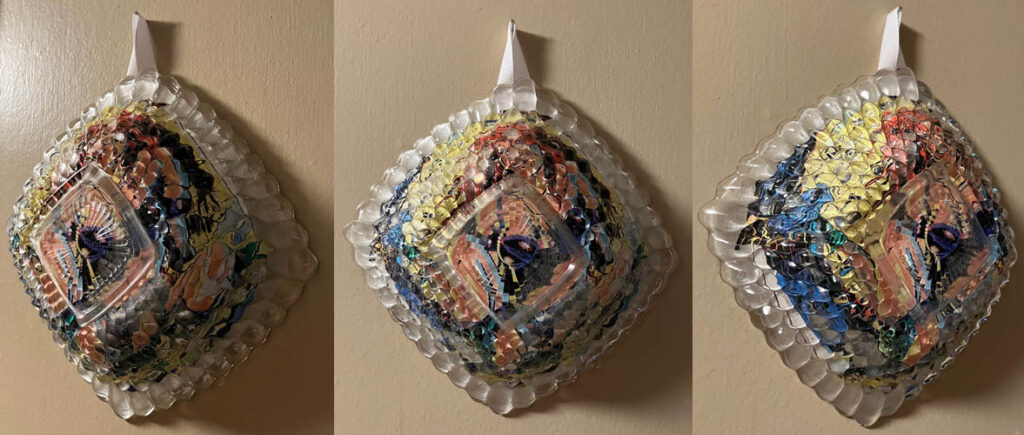
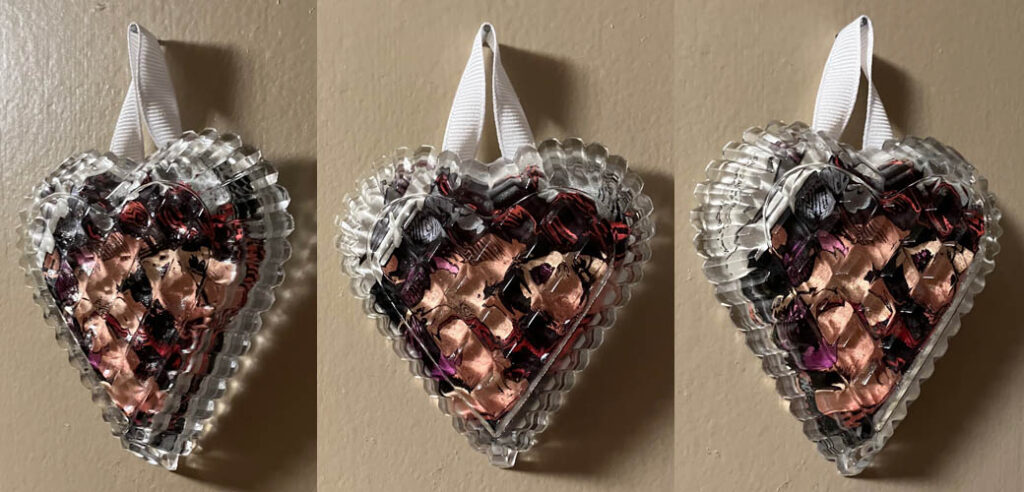
And finally, I found this little heart, which is my personal favorite of the group.
These works are a continuation of my Creepy Comics collage series, shown on Haunted MTL here.
Creepy Comics 5
Feel free to check out more of Jennifer Weigel’s work here on Haunted MTL or on her writing, fine art, and conceptual projects websites.
Original Creations
Zombie Christ – Second Coming Art by Jennifer Weigel
Published
2 weeks agoon
July 14, 2024
So I probably should have taken a before picture, but I found a faux wood stained plaster Jesus statue and turned it into Zombie Christ. Because it’s the second second coming. Or something. It’s kind of an offshoot of my nail polish paintings reappropriating thrift store art…
Anyway without further ado, I present…
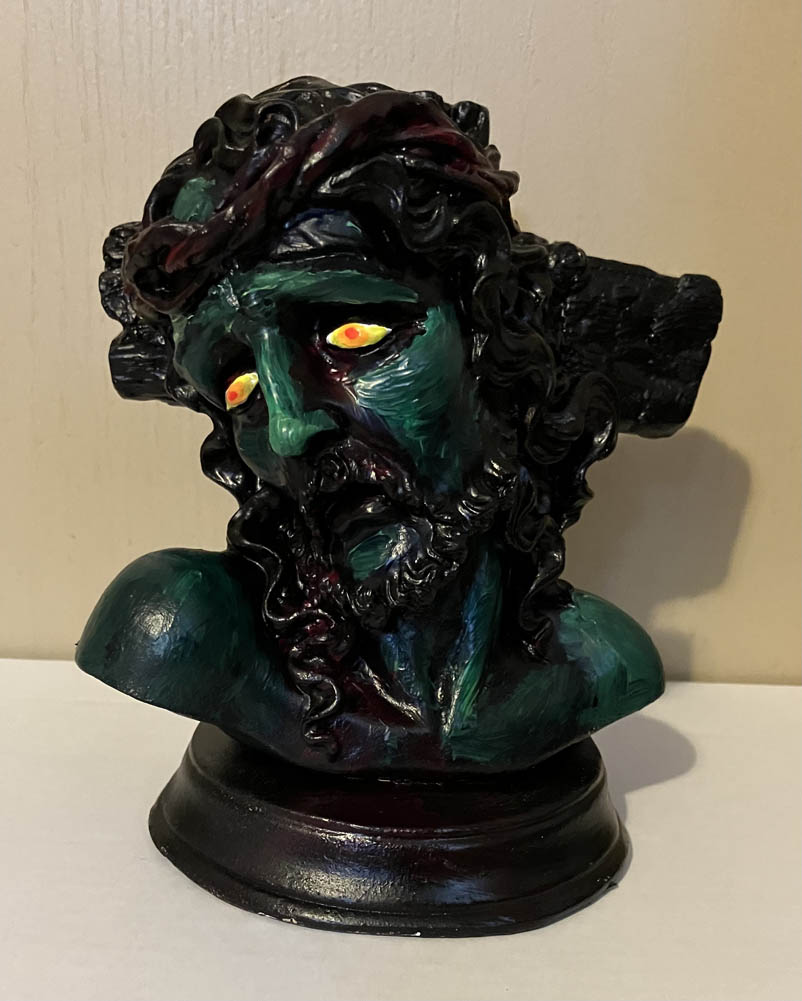
I was a little concerned that I made him too green at first, but I’m happy with the finished result. This statue just looked so anguished. It’s eyes had been closed but I like them better open and even painted them with blacklight reactive nail polish so they will stand out even more and be interactive in other ways to add creepy factor.
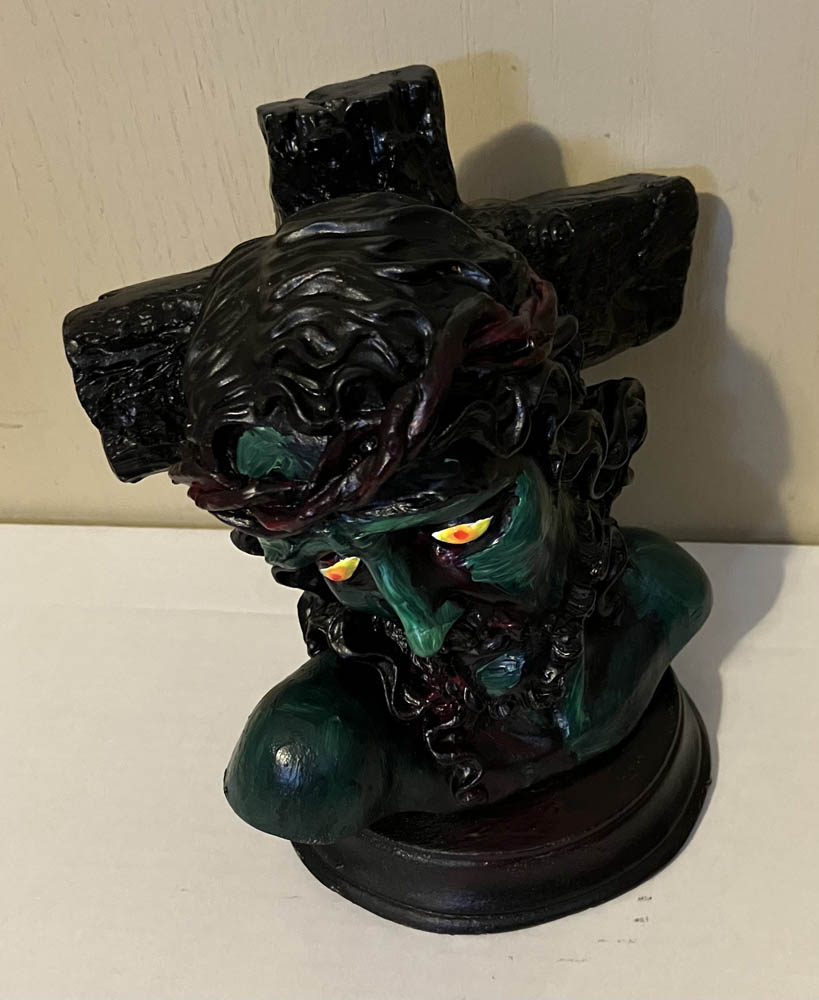
Sadly I don’t have a blacklight anymore or I’d share a picture that way too. Oh well. I’ll leave you with a fun detail shot instead.
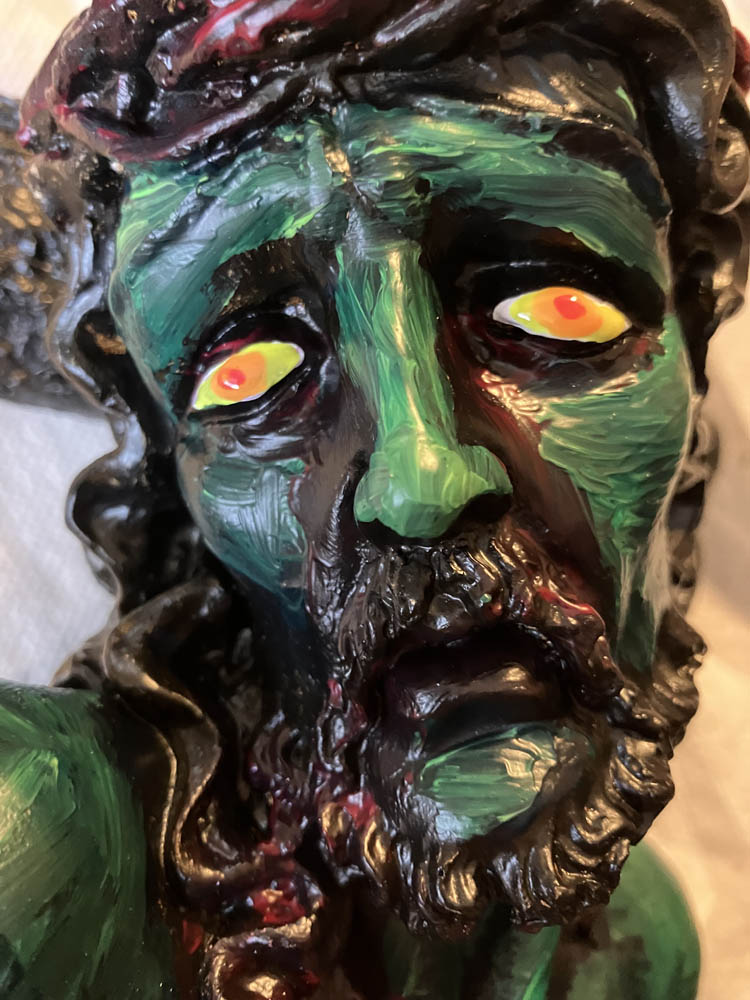
Next time I may make him more gray than green though. We shall see…
Feel free to check out more of Jennifer Weigel’s work here on Haunted MTL or on her writing, fine art, and conceptual projects websites.
Original Creations
Jennifer Weigel Art Collection Highlights Part 3
Published
3 weeks agoon
July 7, 2024
So it’s been awhile since we’ve looked at some of the things I have gathered, so I thought I’d bring back my art collection for another round… Here are the first and second highlights in case you missed earlier explorations.
From left to right: M Pena Windstone Editions bat-winged flap cat, bone mask by Terry and Susan Wright, wood cat in skull by labcreature, real hair art by myself, pencil drawing of Barbarois Elder for Vampire Hunter D anime cel
From left to right: Barbarois Elder for Vampire Hunter D anime cel, Turn Me Royal portrait of my father and stepmother as Frankenstein’s monster and his bride, painted horse skull
Left to right: Overgrowth by Ellie Bradley, heart by TenderFlesh, praying devil girl by Torman’s Treasures
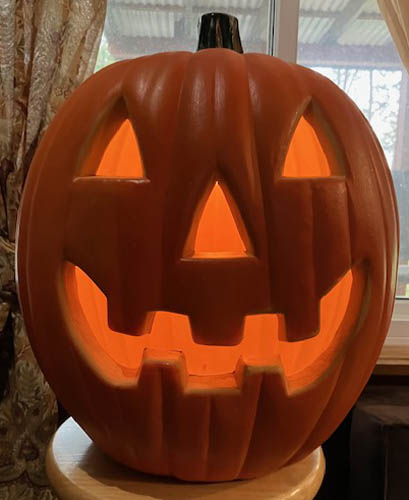
And a vintage plastic 2-foot Jack O Lantern I got at a yard sale and have kept on display on his very own stool in the living room since. So happy.
Anyway, there are some more highlights from my art collection, as it is always growing and evolving. I have lucked into several of these pieces at antique and thrift stores or acquired them from the artists or more. And yes, I still have Da Ting the taxidermy shih-tzu from the first of these posts.








